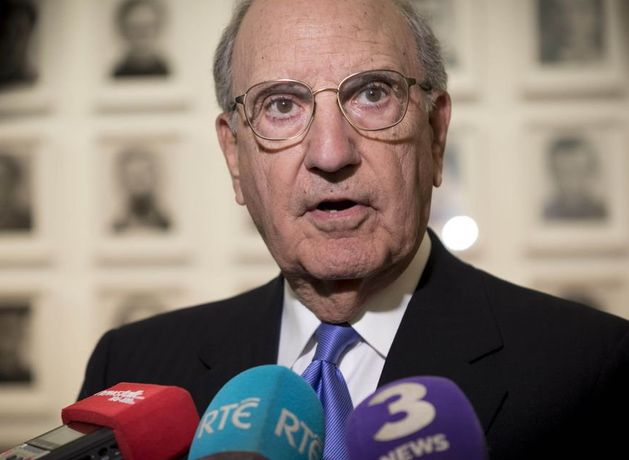Compilation came after peace talks chair George Mitchel also claimed NIO was attempting to sabotage the process
The confidential briefing note is part of the tranche of files made public in the annual release of the State Papers.
A Department of Foreign Affairs official focusing on justice and security created the list in October 2002.
The document starts by referencing a 1999 interview given by George Mitchell, the chairman of the Good Friday Agreement negotiations, in which he claimed that the British and Irish governments, as well as Northern Ireland’s political parties, had leaked information to manipulate public opinion.
However, he further accused the NIO of attempting to sabotage the process by leaking information on British government policy to the media.
Mr Mitchell, a former US senator, is said to have expressed alarm and anger over the frequency of leaks from the NIO – saying they were uniquely “designed to undermine the policy of the British government of which they were a part”.
The Irish civil servant notes that Mr Mitchell himself was subjected to an attempted “smear” when he first arrived in Northern Ireland, as newspaper articles falsely claimed his chief-of-staff Martha Pope had had a liaison with Sinn Féin representative Gerry Kelly with ulterior motives.
The Irish civil servant goes on to list several “leaks”, starting with the publication of a proposed deal in a newspaper while “intense negotiations” for the Downing Street Declaration were under way.
Next, the department lists two “high-profile and damaging leaks issued from the NIO”.
A so-called “game-plan” document was leaked in February 1998, showing that papers had been prepared weeks before the Drumcree march on July 6, 1997. In the preceding years, there had been standoffs and clashes as nationalists opposed the procession of an Orange parade down Garvaghy Road in Portadown.
The game-plan document showed that then Secretary of State for Northern Ireland Mo Mowlam, who was publicly expressing a desire for a negotiated solution to the 1997 parade, advocated “finding the lowest common denominator for getting some Orange feet on the Garvaghy Road”.
In 1997, a large number of security forces were deployed to the area to allow the march to proceed. The incident sparked heightened tension and a wave of rioting.
The document further describes the release of a document submitted by the NIO’s director of communications to the Secretary of State as a “second major leak”.
It claims that a publicity strategy was released to the DUP in the aftermath of the Good Friday Agreement and showed how the UK government would support a ‘yes’ vote in a referendum following any talks agreement.
In addition, it is claimed that unionists used leaked sections of the Patten Commission report on policing to invalidate its findings ahead of its publication in 1999.
The report recommended the replacement of the Royal Ulster Constabulary with the Police Service of Northern Ireland, the changing of symbols, and a 50-50 recruitment policy for Catholics and Protestants.
At the time, UUP leader David Trimble said the recommendations would lead to a corruption of policing in Northern Ireland.
Chris Patten, chairman of the independent commission on policing, said that some of the assertions were a “total fabrication” and designed to “muddy the waters” to create a difficult political atmosphere.
Elsewhere, the author notes that before it was leaked to the media, there was serious disagreement between the governments of the UK and Ireland on the composition of that commission, with not a single name submitted by the Irish side accepted by the other.
The author notes that this incident, still under the heading “NIO leaks”, was believed by British officials to have emanated from the Irish side.
The report turns to leaks of other origin, claiming “disgruntled Special Branch officers” in the North were blamed by the British government for a series of releases about the IRA designed to damage Sinn Féin in the 2001 general election in Northern Ireland.
One senior Whitehall source was quoted in the Guardian as complaining that Special Branch was “leaking like a sieve” after details of an IRA intelligence database containing the names of leading Tories – described at the time as a “hit list” – was passed to the BBC in April 2002.
The reason for creating the list, which the National Archives holds in a folder alongside briefing notes for ministers ahead of meetings with officials from the UK government and NIO, is not outlined in the document itself.
